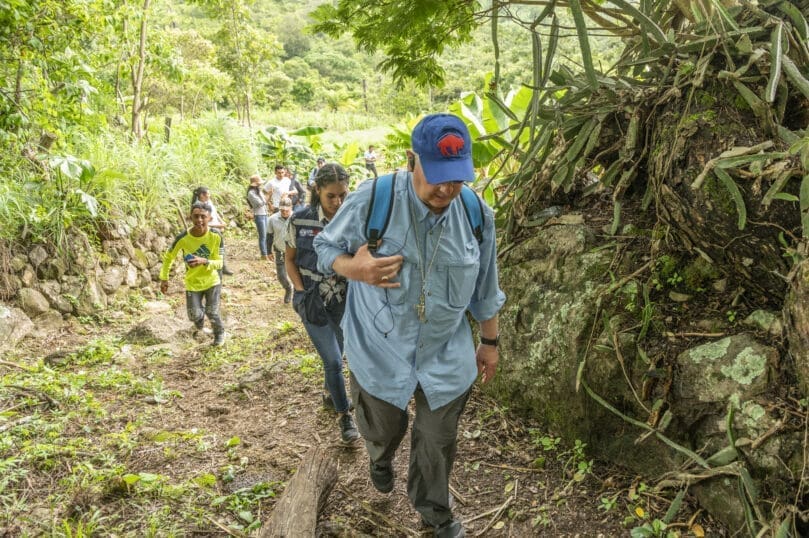 Photo Courtesy of Catholic Relief Services
Photo Courtesy of Catholic Relief Services
Atlanta
Archbishop Hartmayer praises CRS work in Honduras
By NICHOLE GOLDEN, Editor | Published August 11, 2023
ATLANTA—As a member of the Catholic Relief Services Board of Directors, Archbishop Gregory J. Hartmayer, OFM Conv., traveled to Honduras in June to witness the agency’s lifesaving work.
The archbishop has a history with the Honduran people, having led multiple mission trips to the Central American country while he was pastor of St. Philip Benizi Church, Jonesboro.
St. Philip Benizi began a twinning program with Honduran communities following Hurricane Mitch in 1998. More than 7,000 people died during the hurricane, which destroyed crops and washed out bridges.
“That country was so devastated that it literally set it back 10 years,” recalled Archbishop Hartmayer.
The Jonesboro parishioners began their mission work by gathering clothes for the people of Honduras.
“It was such a terrific response that we filled a container that went over there with t-shirts, shoes and hats,” he said.
The friars of the archbishop’s order in Santa Ana distributed the goods. Parish leaders made contact with local Franciscan friars to organize the first of 10 trips there. Parents and teenagers joined then-Father Hartmayer for the mission trips spread over a decade.
The Franciscan community of Santa Ana served 75 mission chapels, many only accessible in the dry season.
“We developed a relationship with the friars there and they were able to show us the places that needed some help,” said Archbishop Hartmayer.
While the men were out working agricultural or construction jobs, the women helped the mission group rebuild chapels. “We built one chapel there right from scratch,” he said.
Every year, the Jonesboro group connected with a new community, often stocking up on items like flip-flops to take with them. The $1 shoes were regarded like new Easter shoes by the Honduran children. The parishioners packed instant cameras so children could have a photo to keep of themselves.
“They don’t have mirrors in their house,” said the archbishop. “They don’t know what they look like. Imagine that?”
The return trip
It had been 13 years since Archbishop Hartmayer last visited Honduras. From June 18-23, he traveled to the country to learn about the work of Catholic Relief Services in agriculture, health, education and water and sanitation. He traveled with CRS board members to La Paz, Comayagua and other communities.
“First and foremost, we went to a school, and we saw that the local community grew food, vegetables mainly—corn, carrots, beans, peppers—and they would harvest this food and they would distribute this to the schools in that community,” said Archbishop Hartmayer.
He was astounded to learn 97,000 children are fed daily through this program. The mothers of the students prepare the meals during the school day.
“Education is important, but they can’t learn if they’re hungry,” said Archbishop Hartmayer.

Archbishop Gregory J. Hartmayer enjoyed lunch served at a school community during his visit to Honduras in June to witness the work of Catholic Relief Services. A farm program helps feed 97,000 children daily. Photo Courtesy of Catholic Relief Services
CRS has worked in Honduras since 1959, where the current per capita income is a little more than $2,300 a year. Poverty, violence, malnutrition and disease are issues Hondurans face. There is no national health care system, but smaller clinics exist.
“They know what needs to be done,” he said. Often, CRS collaborates with other development agencies. The archbishop said CRS, which is the international relief organization representing the U.S. bishops, has the trust of the American government in delivering its aid.
CRS serves 193 million people in 116 countries. The organization has 70 employees in Honduras.
The board members also learned about improvements in the area of irrigation. Honduras has six months of rain, followed by six months of drought, which makes crop growth difficult.
“The rain is heavy and it’s fast,” said Archbishop Hartmayer.
CRS has trained locals in better irrigation methods and introduced beans and other low-growing crops less affected by wind damage.
“We also saw a water treatment plant they have developed,” added the archbishop.
The community gathered water that flowed from a mountain, but it was murky and could be polluted by animal excrement.
“They captured this water and developed an irrigation system that went through a number of steps for filtering without electricity,” said Archbishop Hartmayer. In addition, the water was tubed into 600 homes that had no running water.
“It has changed their lives,” he said.
A saving faith
As the only priest on the trip, Archbishop Hartmayer concelebrated daily Masses with local clergy.
Hondurans put a lot of sweat equity into building their churches sometimes with adobe and straw, he noted.
“They’re very proud of their church. Every little village has a chapel. Whoever lives across the street has the key,” he said.
That key holder is the “delegate of the Word,” often serving as a catechist. When the priest arrives for a weekly or monthly visit, the delegate rings the bell to let the community know. Mass is their encounter with the Eucharist, since the conditions do not make adoration possible, said the archbishop.
During an emotional closing session on the last evening, board members shared reflections on the experience. The archbishop said they were “leaving with a sense of ‘I’ve done something good. I’ve lived the Gospel.’”
While it was important for board members and donors to see how funds are used, the prevalent attitude among supporters was one of gratitude for having received more than given.
“You could just feel it in the room,” said Archbishop Hartmayer.
He emphasized the work undertaken is “largely due to the generosity of the American people.”

Archbishop Gregory J. Hartmayer, OFM Conv., blesses a Honduran child during Mass in the Central American country. He visited as part of his work with Catholic Relief Services this summer. Photo Courtesy CRS
Catholic Relief Services is often the frontline responder when a natural disaster strikes overseas.
Archbishop Hartmayer said it’s the faith that survives and saves amid often-miserable conditions in Honduras and other disaster-stricken areas.
“That’s how they cope with it,” he said. “They truly believe in God’s goodness.”
Disasters or hardships do not seem to shake the faith of Hondurans.
“They are determined people,” said Archbishop Hartmayer.
He said the most recent journey was a good reminder of CRS’ efficiency and the dedication of its trained employees.
“A big word for CRS is ‘sustainability,’” said the archbishop. The organization is not going to invest time or money into a program that won’t work.
“We’re showing them how to fish and not just giving them a fish,” he said.
